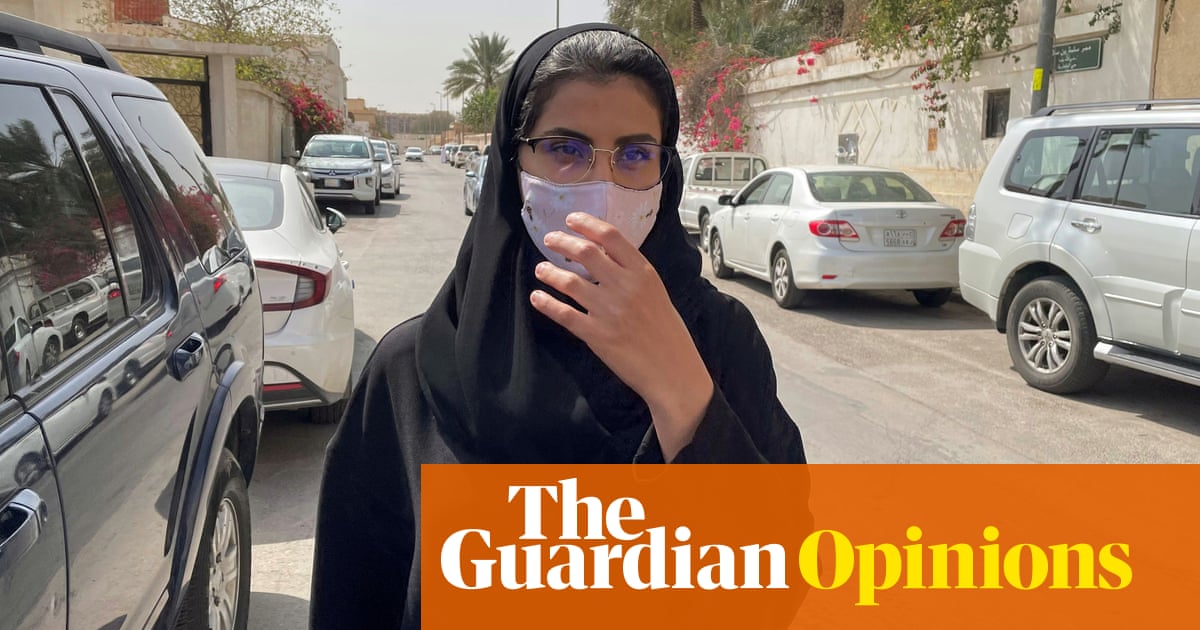
Saudi Arabia is rebranding. Since 2016, when it first announced plans to diversify its economy, it has poured billions into making the kingdom appear more progressive to outsiders. Women can now drive and work in jobs they were previously banned from. Vast sums are being invested in futuristic, architectural “gigaprojects”, such as the Line – a sprawling, desert supercity – to attract global tourism.
And yet, inside the kingdom, its citizens tell a very different story. Against a backdrop of image-building projects, thousands of Saudi citizens, according to some reports, could be being blocked by the state from leaving the country with arbitrary and illegal travel bans. Their crime? Advocating for basic human rights.
Among them is my sister, Loujain al-Hathloul. Loujain is a prominent Saudi women’s rights defender who led the campaign against the ban on women driving and tirelessly campaigned for the abolition of the male guardianship system.
Loujain’s brave and outspoken activism was met with repression by the Saudi authorities. In March 2018, she was abducted from the streets of the United Arab Emirates and forcibly brought back to Saudi Arabia. Once on Saudi soil, she was placed under an illegal travel ban and forbidden from leaving the country – only to be arrested arbitrarily a few months later. Her charges explicitly mentioned her human rights work, and my sister was tried under counter-terrorism legislation in the specialised criminal court (SCC), routinely used as a tool to muzzle civil society. Loujain was released from prison in February 2021 under strict conditions, including being barred from leaving the kingdom. Her travel ban was supposed to end, after nearly three years, on 13 November 2023. Yet, in February of this year, well after the expiry of the ban, Loujain was told that she remains under a permanent travel ban with no expiry date. The authorities have never provided any justification, and continue to ignore our inquiries.
This is the case not just for Loujain, but for our entire remaining family in Saudi Arabia, who found out in 2018 that they too were prohibited from travelling, without reference to any judicial ruling – and have been unable to resolve the issue since. These blatant violations of the right to freedom of movement are in direct contradiction of international law as well as Saudi Arabia’s own legal framework.
Living in Saudi Arabia under a travel ban is to live in a constant state of fear, as we know the modus operandi of the authorities. Usually, as was the case with Loujain, the kingdom bans someone from leaving and then, later, they arrest them.
I live in Brussels, and I haven’t seen my family in more than six years. Every day, when I wake up in the morning, I have to check whether my family is still safe. I miss them and wish I could have the opportunity, like everyone else, to go back to Saudi Arabia to see them. But I know I would be trapped there too if I were to go back.
My family’s story is one of many. Maryam al-Otaibi, another courageous women’s rights activist, has also experienced imprisonment and repression. She was placed under an illegal travel ban in 2019. When she denounced her treatment on social media, she was summoned by police and charged for speaking out about her ordeal. She was sentenced to four months in prison and fined 100,000 riyals (£21,300).
This is a systemic issue that will not go away by itself. Despite outward shows that the kingdom is becoming more progressive, the Saudi authorities routinely employ arbitrary travel bans as a tool of repression. As a result, individuals are deterred from engaging in human rights work for their own safety and that of their relatives.
Since such travel bans lack legal basis, there is no way to formally appeal them. Those affected are not notified and only find out about the restrictions when attempting to travel outside the kingdom. They are unable to pursue their personal goals or visit family members abroad.
As Saudi Arabia seeks to rebrand itself on the world stage as an increasingly moderate power, we must not ignore the glaring hypocrisy of the government promoting tourism while denying its own citizens the fundamental right to freedom of movement. The international community must hold Saudi Arabia to account for its egregious human rights violations – and not let sportswashing and celebrity partnerships distract from what life is truly like for the kingdom’s citizens.
It is high time for Saudi Arabia to open itself up not only to tourists but also to the voices of its own people. Until then, the facade of glittering progress will remain just that, masking a harsh reality of repression and injustice.
-
Lina al-Hathloul is head of monitoring and advocacy at ALQST for Human Rights. She is co-author of the book Loujain Dreams of Sunflowers. Foz al-Otaibi, who also contributed to this article, is a social media influencer and a women’s rights activist who was indicted by the Saudi government for her social media activity and is now living in exile